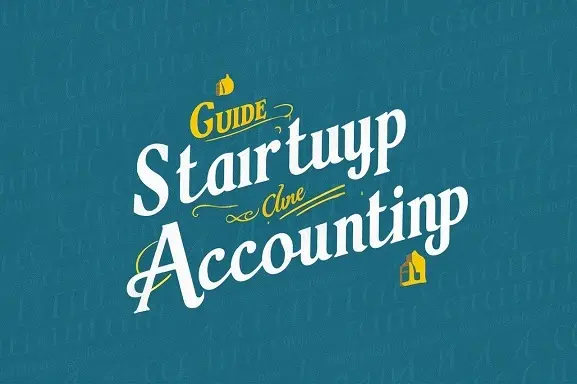The Founder’s Guide to Startup Accounting

You’ve created your startup and now you are set on product development, marketing, recruitment, funding, and all other things that are not bookkeeping. However, after some time or at some point, the founder begins to understand that he or she needs to organize the accounting function correctly in business.
Accounting is therefore a very vital aspect of any organization even though it may not be very popular. At a minimum, accounting helps startups:
- This entails tracking the amount of money coming in (revenue) and the amount of money is going out (expenses) to determine the health of the business.
- Decisions include rental or lease of equipment, setting of prices to charge customers
- Obey the laws of the country and ensure that taxes are paid as required to minimize instances where organizations end up in legal trouble.
- Finances can be raised by presenting the company's financial data in terms of past and future performance to the investors.
The following guide is designed to help young startup founders learn about the process of accounting for their startup.
Why Outsourcing Your Accounting Usually Makes Sense Initially
Starting your startup, you have to concentrate on creating an amazing product and having users who would adopt it. Outsourcing such operational tasks as accounting enables you to do just that, to outsource your company’s back-office functions to the experts.
Realizing that it is difficult to control accounting, it is also not quite logical to try to do this yourself at the initial stages. The level of activity is low, and more than likely you do not possess a strong background in accounting and its rules.
Instead, most startups turn to outsourced accounting services to handle functions like:
- Chart of Accounts and the general ledger
- Accounts processing of invoices, expenses, and salary.
- Managing accounts receivable/payable
- This entails mastering cash flow analysis and projection.
- Compiling monthly/quarterly reports of financial performance
- Backing up the auditing and tax return procedures
A complete accounting solution for early-stage startups takes place by providing services in accounting, bookkeeping, payroll, and outsourced CFO advisory services. They also offer dashboard reporting of some other measures such as cash burn rate which enables the founders to keep track of their startup’s position.
When to bring Accounting in-house
While your start-up business expands, you may need to decide on the best approach, whether to continue outsourcing or to bring the accounting function within your company. The nature of whom one is buying or selling to, how much they need to fund, or how many transactions they are likely to conduct in a given period define when is appropriate.
Most startups make the switch when they reach major milestones like:
- Higher funding than $1 million
- New additional people increased to 30-50+ employees
- The number of transactions per month in thousands:
This stage is optimal for centralizing primary accounting operations within the organization while continuing to rely on outsourcing for various peripheral tasks and depending on current capacity and demand.
Some of the specific positions that need to be filled within an in-house accounting department include:
As you scale accounting internally, consider adding the following key roles:
Controller: The controller heads the accounting department and supervises the financial reporting, budgeting, and other policies and controls. They are commonly the startup’s FP&A specialist.
Staff Accountants: The reason for getting new accountants is that with high transaction volume, having separate people who are solely responsible for every type of transaction ensures that there is efficiency as well as proper segregation of duties in handling large volumes of invoices, expenses, payroll entries, and others.
Accounts Payable (A/P) Clerk and Accounts Receivable (A/R) Clerk: Unlike other accounts departments, A/P and A/R clerks are solely employed for the right recording and management of vendors' payables/receivables. This adds to reliability when volumes surge as it is more challenging to make mistakes or errors in a single transaction.
Tax Accountant: A tax professional from within or an outside consultant who is well-versed in startup/VC taxonomy regarding everything from the raised funding to equity grants for employees as well as IPO preparedness.
Establishment of the right financial systems
Getting this right by having the best financial systems in place makes accounting to be easy as your start-up grows. Core systems include:
General Ledger: The GL is used as the file that holds all transactions associated with your Chart of Accounts. Most prominent ERP systems, such as NetSuite or QuickBooks, connect with other systems to continuously feed transaction data into the GL.
Expense Reporting Platform: Such a platform like Expensify means that they can be able to submit their expenses from the comfort of their mobile device by taking pictures of the receipt. It integrates seamlessly with your payables process or, in other words, it resides within the payables cycle.
Billing & Invoicing: Tools like Freshbooks empower startup businesses to assume primary billing processes that include the preparation of invoices, issuing of invoices, and tracking of time among other duties.
Payroll Platform: There are platforms for payroll like Gusto that can assist in making the process more manageable, such as calculating taxes, benefits, and year-end tax filings.
Financial Reporting: Thus, modern cloud platforms, such as Flight. vc and Float, allow reporting based on real-time data from accounting applications, providing dynamic analytics of cash burn, P&L, and more.
Correct Choices of Accounting Systems = Startup Success
Every function in a business organization has a direct or indirect effect on the profitability of an organization, and accounting provides the necessary figures and information needed in the operational management of the business. The adoption of the strategies presented in this founder’s guide prepares start-ups for accounting at the growth stages right through to profitability!
Contact us here for Accounting services now!
